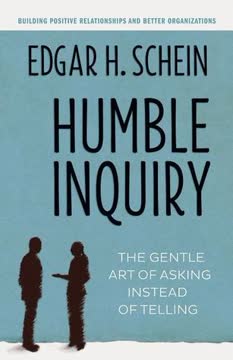Key Takeaways
1. The Hierarchy of Needs Applies to Business Relationships
"Just like human beings cannot survive by spending all of their time on self-actualization without attending to their physiological needs, some nonprofit organizations focus the whole employee experience on the sense of meaning that's created in the workplace—at the risk of losing employees because their compensation doesn't cover their rent."
Maslow's theory in business. Abraham Maslow's Hierarchy of Needs can be applied to three key business relationships: employees, customers, and investors. Each relationship has its own pyramid, progressing from basic needs to self-actualization:
- Employee Pyramid: Money → Recognition → Meaning
- Customer Pyramid: Satisfaction → Commitment → Evangelism
- Investor Pyramid: Trust → Confidence → Pride of Ownership
Balancing needs. Successful businesses address all levels of these pyramids, recognizing that while higher needs are important, basic needs must be met first. For example, a company cannot focus solely on creating meaning for employees if their base compensation is insufficient.
2. Employee Motivation Goes Beyond Money
"Compensation is a right; recognition is a gift."
Recognition's power. While fair compensation is essential, it's not the primary driver of employee motivation and loyalty. Recognition plays a crucial role in creating engaged and productive employees. This can take many forms:
- Informal recognition: Positive feedback, spontaneous gifts
- Formal recognition: Awards ceremonies, performance reviews
- Public acknowledgment: Company-wide announcements, newsletters
Creating meaning. The highest level of employee motivation comes from finding meaning in their work. This involves:
- Connecting individual roles to the company's larger mission
- Providing opportunities for personal growth and development
- Fostering a sense of community and belonging within the organization
3. Customer Loyalty Stems from Unrecognized Needs
"If buying your product helps your customers to get in touch with a higher vision of themselves, you are helping to facilitate a peak experience."
Beyond satisfaction. Meeting basic customer expectations is necessary but not sufficient for creating true loyalty. Companies must strive to understand and fulfill customers' deeper, often unrecognized needs.
Creating peak experiences. Truly loyal customers are those who feel transformed or elevated by their interactions with a company. This can be achieved by:
- Helping customers meet higher goals
- Allowing customers to express themselves through the product or service
- Connecting customers to a larger cause
- Offering something unexpected and delightful
Understanding desires. Companies can use technology and empathetic service to gain deeper insights into customer desires, enabling mass customization and personalized experiences.
4. Investors Seek More Than Financial Returns
"The scarce commodity in the investment world isn't necessarily a good deal but a good partner relationship."
Relationship alignment. While financial returns are important, investors increasingly value long-term relationships with companies and entrepreneurs. This progression can be seen as:
- Transactional Alignment: Focus on deal structure and financial metrics
- Relationship Alignment: Collaborative partnership and shared goals
- Mission Alignment: Investing for legacy and social impact
Legacy investing. A growing segment of investors seeks to make a difference with their capital, looking for companies that balance profit with purpose. This trend is evidenced by:
- Rise of socially responsible investing (SRI)
- Increased focus on environmental, social, and governance (ESG) factors
- Growth of impact investing and mission-driven venture capital
5. Corporate Culture Drives Peak Performance
"Culture is about 'performance not conformance.'"
Culture as competitive advantage. A strong, positive corporate culture can be a powerful driver of business success. It influences:
- Employee satisfaction and retention
- Customer loyalty and brand perception
- Investor confidence and long-term value creation
Creating a culture of excellence. Effective cultures are intentionally shaped and reinforced through:
- Clear articulation of company values and mission
- Leadership behavior that models desired traits
- Systems and processes that reinforce cultural norms
- Regular communication and celebration of cultural wins
Measuring culture's impact. While intangible, culture's effects can be measured through:
- Employee engagement surveys
- Customer satisfaction and loyalty metrics
- Financial performance indicators
6. Self-Actualization is the Ultimate Goal
"We fear our highest possibilities. We are generally afraid to become that which we can glimpse in our most perfect moments, under conditions of great courage."
Transcending limitations. Self-actualization represents the pinnacle of human potential, where individuals fully realize their capabilities and find deep fulfillment. In business, this applies to:
- Employees finding meaning and purpose in their work
- Customers experiencing transformation through products or services
- Investors feeling pride in supporting ventures that make a difference
Characteristics of self-actualized individuals:
- Experience frequent "peak experiences" of flow and fulfillment
- Cultivate periods of quiet reflection and meditation
- Quickly connect with like-minded others
- Demonstrate reduced fear and increased spontaneity
Cultivating self-actualization. Organizations can foster environments conducive to self-actualization by:
- Encouraging personal growth and development
- Providing autonomy and opportunities for creativity
- Connecting individual roles to larger, meaningful goals
7. Align Your Work with Your Calling
"Always get to know the character of those whose approval you wish to earn, and, the nature of their guiding principles."
Job, career, or calling. People typically view their work in one of three ways:
- Job: Focus on financial rewards, fulfillment found outside work
- Career: Emphasis on advancement and external recognition
- Calling: Work is inherently fulfilling, regardless of money or status
Finding your calling. Discovering and pursuing one's calling leads to greater satisfaction and peak performance. Characteristics of a calling include:
- Uniqueness to the individual
- Alignment with natural talents
- Sense of renewed energy from the activity
- Often challenging to discover
Prioritizing with pyramids. Use the concept of hierarchical needs to set priorities in work and life:
- Base level: Survival needs (basic sustenance, comfort)
- Middle level: Success needs (performance enhancement, recognition)
- Peak level: Transformation needs (intangible, deeply satisfying experiences)
By consciously aligning work with personal values and seeking opportunities for growth and meaning, individuals can move towards self-actualization and create more fulfilling professional lives.
Last updated:
FAQ
What's Peak: How Great Companies Get Their Mojo from Maslow about?
- Human Potential Focus: The book explores how companies can leverage Maslow's Hierarchy of Needs to boost employee motivation, customer satisfaction, and investor relationships.
- Three Relationship Truths: Conley introduces the "Relationship Truths Pyramid," focusing on employees, customers, and investors, emphasizing fulfilling their needs at various levels.
- Transformational Leadership: By addressing higher-order needs, companies can create a more engaged workforce and loyal customer base, leading to sustainable success.
Why should I read Peak: How Great Companies Get Their Mojo from Maslow?
- Practical Application: The book offers actionable insights on applying Maslow's theories in business, making it relevant for leaders and managers.
- Real-World Examples: Conley shares stories from his experience with Joie de Vivre Hospitality, illustrating how these principles lead to peak performance.
- Meaningful Work Focus: It encourages readers to rethink their approach to work and relationships, promoting a culture that values human connection and fulfillment.
What are the key takeaways of Peak: How Great Companies Get Their Mojo from Maslow?
- Hierarchy of Needs: Fulfilling basic needs is essential before addressing higher-level aspirations in employees, customers, and investors.
- Creating Peak Experiences: Designing experiences that inspire and engage stakeholders leads to loyalty and commitment.
- Karmic Capitalism: Businesses can thrive by focusing on long-term relationships and stakeholder well-being, rather than short-term profits.
What are the best quotes from Peak: How Great Companies Get Their Mojo from Maslow and what do they mean?
- “What man can be, he must be.”: Emphasizes the potential within every individual and the importance of environments that allow people to reach their full capabilities.
- “Disappointment is the natural result of badly managed expectations.”: Highlights the need for companies to manage customer expectations effectively to avoid dissatisfaction.
- “People want to work for a cause, not just for a living.”: Reflects the idea that employees are more engaged when their work contributes to a greater purpose.
How does Chip Conley apply Maslow’s Hierarchy of Needs in Peak?
- Employee Pyramid: Uses Maslow's framework to illustrate employee needs, from basic survival to self-actualization, leading to higher engagement.
- Customer Pyramid: Focuses on customers' unrecognized needs and desires, creating more meaningful experiences.
- Investor Pyramid: Highlights the importance of aligning investor goals with the company’s mission to foster trust and long-term relationships.
What is the Employee Pyramid in Peak?
- Three Levels of Needs: Consists of Money (base needs), Recognition (social and esteem needs), and Meaning (self-actualization).
- Base Needs: Ensures employees' financial needs are met to create a stable foundation for engagement.
- Higher-Level Needs: Recognition and meaning are crucial for fostering loyalty and inspiring employees to perform at their best.
How does Peak define Karmic Capitalism?
- Long-Term Focus: Prioritizes long-term relationships with employees, customers, and investors over short-term profits.
- Transformative Impact: Companies can create positive change by aligning business practices with stakeholders' higher needs.
- Mutual Benefit: Investing in the well-being of all parties cultivates loyalty and trust, leading to sustainable success.
What is the significance of the Customer Pyramid in Peak?
- Understanding Customer Needs: Mirrors the Employee Pyramid, focusing on satisfying basic needs before addressing higher-level desires.
- Satisfaction vs. Loyalty: Mere satisfaction does not guarantee loyalty; companies must exceed expectations to foster commitment.
- Creating Meaningful Experiences: Aims to create peak experiences for customers that resonate emotionally, leading to long-term relationships.
How can businesses create a high-trust environment according to Peak?
- Open Communication: Honest and direct communication builds trust and fosters a collaborative environment.
- Alignment of Goals: Ensuring company goals align with those of employees and investors creates shared purpose and commitment.
- Emotional Connections: Understanding deeper motivations of stakeholders enhances trust and engagement.
How does Peak suggest companies can exceed customer expectations?
- Understanding Unrecognized Needs: Identifying and addressing unrecognized needs can lead to delightful customer experiences.
- Creating Community: Engaging customers in meaningful ways fosters a sense of belonging and loyalty.
- Empowering Employees: Empowering employees to enhance customer experiences leads to better service and satisfaction.
What is the Joie de Vivre Heart and its significance?
- Cultural Framework: Represents the company’s commitment to a unique corporate culture, emphasizing employee satisfaction and customer loyalty.
- Leading Indicators: Employee morale and customer satisfaction are leading indicators of business success.
- Employee Engagement: Used in training to instill company values, encouraging authentic and caring customer interactions.
What is the significance of the Transformation Pyramid in Peak?
- Three Levels of Transformation: Consists of survival, success, and transformation, guiding companies in addressing stakeholder needs.
- Focus on Higher Needs: Aims to move beyond basic survival and success to create transformative experiences.
- Organizational Growth: Prioritizing transformation fosters sustainable growth and competitive advantage.
Review Summary
Peak explores applying Maslow's hierarchy of needs to business. Conley shares insights from his experience leading Joie de Vivre hotels, emphasizing the importance of fulfilling higher-level needs for employees, customers, and investors. Many readers found the book insightful and applicable, praising its focus on creating meaning and inspiring loyalty. Some felt it was repetitive or oversimplified. The employee and customer pyramids were well-received, while the investor pyramid was more divisive. Overall, readers appreciated the book's emphasis on relationships and human potential in business.
Similar Books










Download PDF
Download EPUB
.epub digital book format is ideal for reading ebooks on phones, tablets, and e-readers.





